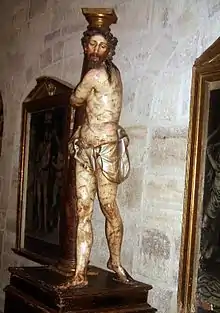

Sebastián Ducete (or de Ucete; 1568–between 1619[1][2][3] and 1621[4]) was a Spanish sculptor. He was born to the sculptor Pedro Ducete Díez in Toro, Zamora[1][2] in whose workshop Sebastián collected first experiences.[5] From 1591 on he was trained by the sculptor Juan Sanz de Torrecilla from Palencia.[2] From 1595 to 1598 he worked in one workshop with his uncle Juan Ducete the Younger.[5]
1598 Esteban de Rueda entered Ducete's workshop as an apprentice. From 1612 to Ducete's death he was his partner.[5] The workshop of these two is known as Toro workshop.[2] In 1611 Ducete was in Valladolid.[2]
It is difficult to differentiate between Ducete and Rueda since both were influenced by Juan de Juni and Gregorio Fernández though the influence of Juni on Ducete was stronger, his style is more expressive, dynamic and mannerist.[2] One of the workshop's main works is the main retable in the Iglesia de San Miguel Arcángel in Peñaranda de Bracamonte, Salamanca. Ducete and Rueda signed the contract for the work on 11 June 1618. It is disputed if Ducete still worked on the retable. Van Hess claims that Ducete died in 1619 before working began.[2] In 1971 a fire in the church destroyed the retable apart from two figures.[6] Ducete died in Toro.
Works
- Crucifixion and a statue of the Virgin (1592), San Martín, Pinilla de Toro[1]
- Retable (1602), San Sepulcro, Toro[1]
- Sculptures of the retable, church of the Monasterio de Santa Sofía, Toro[1]
- Retable with the fine relief of the Granting of the chasuble to Saint Ildefonsus (1607), San Pedro, Villalpando. It is influenced by Juni. Rueda worked on the garments which are influenced by Gregorio Fernández.[1]
- Paso processional figure of Christ with articulated arms (1615; untraced), for a Cofradía del Santo Entierro[1]
- Relief Virgin and Child with Saint Anne as part of a retable possibly for the Convento de los Carmelitas Descalzos in Medina del Campo, Santuario Nacional de la Gran Promesa, Valladolid.[1] Ducete's style is influenced by Juni. It contrasts with the predella by Rueda who completed the retable.[7]
- (Attributed) Christ on the Cross (early 17th century), polychrome wood carving, Museu Frederic Marès, Barcelona, MFM 1120
 Main retable in the Iglesia de San Miguel Arcángel, Peñaranda de Bracamonte
Main retable in the Iglesia de San Miguel Arcángel, Peñaranda de Bracamonte Sculptures of the retable in the church of the Monasterio de Santa Sofía, Toro
Sculptures of the retable in the church of the Monasterio de Santa Sofía, Toro Relief Virgin and Child with Saint Anne, Santuario Nacional de la Gran Promesa, Valladolid
Relief Virgin and Child with Saint Anne, Santuario Nacional de la Gran Promesa, Valladolid
References
- 1 2 3 4 5 6 7 8 González, J. J. Martín. "Ducete, Sebastián". Grove Art Online. Oxford Art Online. Oxford University Press. Retrieved 28 January 2017.
- 1 2 3 4 5 6 7 van Hees 2001
- ↑ "Ducete, Sebastián (Spanish sculptor, 1568-1619)". ULAN. Retrieved 20 December 2016.
- ↑ Vasallo Toranzo, Luis. "Sebastián Ducete (Toro, 1568 - 1621) "Christ at the column"". Caylus. Caylus Anticuario S.A. Archived from the original on 22 December 2016. Retrieved 20 December 2016.
{{cite web}}: CS1 maint: unfit URL (link) (PDF) - 1 2 3 Torras Virgili 2016, p. 90.
- ↑ Cf. Peñaranda de Bracamonte#Peñaranda hasta la actualidad in the Spanish Wikipedia.
- ↑ González, J. J. Martín. "Rueda, Esteban de". Grove Art Online. Oxford Art Online. Oxford University Press. Retrieved 28 January 2017.
Further reading
- González, J. J. Martín. "Ducete, Sebastián". Grove Art Online. Oxford Art Online. Oxford University Press. Retrieved 28 January 2017.
- González, Nieto; Ramón, José (1977). "La huella de Juni en el escultor Sebastián de Ucete". Boletín del Seminario de Estudios de Arte y Arqueología (in Spanish). Universidad de Valladolid (43): 445–452. ISSN 0210-9573.
- van Hees, Horst (2001). "Ducete, Sebastián". Allgemeines Künstlerlexikon - Internationale Künstlerdatenbank - Online (in German). Vol. XXX. p. 170. Retrieved 28 January 2017.
- Torras Virgili, Montserrat (2016). "Sebastián Ducete – Kruzifix". In Kunsthalle der Hypo-Kulturstiftung, München; Staatliche Museen zu Berlin, Gemäldegalerie (eds.). Spaniens goldene Zeit: Die Ära Velázquez in Malerei und Skulptur [The Spanish golden age: Painting and sculpture in the time of Velázquez] (in German). Munich: Hirmer. pp. 90–91. ISBN 978-3-777-42478-1.